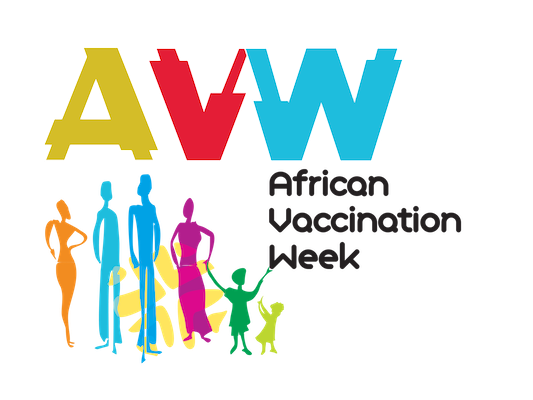A: African Vaccination Week (AVW) is led and coordinated by the World Health Organization (WHO) Regional Office for Africa and implemented by countries in the region. This initiative provides a unique opportunity for countries and partners to strengthen national immunization programmes through advocacy and partnerships.
The over-arching slogan of AVW is “Vaccinated communities, Healthy communities”. Each year, a suitable theme is chosen to reflect current regional priorities and the public health realities..
The first AVW was celebrated in April 2011 under the theme “Put mothers and children first - Vaccinate and stop polio now”. That year, 40 countries in the Region organized activities to celebrate the event. In subsequent years, countries have continued to conduct vaccination campaigns, catch up vaccination activities, health promotion activities and to provide other child survival interventions. Results achieved so far by the annual celebration of the AVW are encouraging and predict a more promising future for immunization.
This year, AVW will be celebrated from 23 to 29 April 2018. The theme for AVW 2018 is “Vaccines work, do your part!”
The focus of AVW is on strengthening national immunization programmes in the African Region. Strengthening immunization programmes is achieved through raising awareness of the value and importance of immunization and increasing vaccination coverage and the uptake of new and existing vaccines. The opportunity is taken to provide an integrated package with a wide range of other lifesaving interventions
In 2010 during the 60th session of the regional Committee in Malabo, AVW was established and endorsed by all Member States in the African Region to maintain advocacy, increase community participation and improve delivery of immunization services.
Country participation in AVW is flexible and national goals and activities for AVW are chosen in accordance with national health objectives based on strong evidence.
WHO records show that around 38 African countries have been involved in Mother and Child Health Days/Weeks or similar endeavours over the past years. AVW does not replace these time-honoured activities.
In fact, AVW builds momentum to further raise awareness in order to engage key audiences on the value and importance of immunization and other key interventions.
The WHO Regional Office in collaboration with UNICEF provides technical support including developing planning guidelines and tools as well as monitoring and reporting frameworks to assist national health authorities to plan, implement and monitor relevant health promotion activities including AVW according to national health goals and local epidemiologic evidence.
Valuable support is also provided by key partners including other United Nations agencies, bilateral and multilateral organizations, NGOs and civil society.
Immunization is one of the most successful and cost effective health interventions. It has been shown to prevent between 2- 3 million deaths every year and has reduced morbidity and mortality across the world in a safe and cost-effective manner.
From infants to senior citizens, immunization prevents debilitating illness, disability and death from vaccine-preventable diseases. When vaccines are combined with other health interventions such as vitamin A supplementation to boost children’s immune systems, provision of deworming medicine, growth monitoring, and distribution of insecticide-treated nets to prevent malaria, immunization becomes a major force for child survival.
In addition, the benefits of immunization are increasingly being extended to adolescents and adults, providing protection against life-threatening diseases such as influenza, meningitis, and cancers that occur in adulthood.
Vaccines provide benefits beyond health outcomes, including averted medical costs and reduced time spent by parents and health care workers caring for sick children. These savings accrue to families, communities and nations as improvements in education, economic growth and poverty reduction. One study reported that increased coverage of new and underutilized immunizations delivered in Gavi-eligible countries could deliver a rate of return on investment of 18% by 2020
In addition to immunization activities, delivery of other high impact interventions may include:
- Vitamin A supplements to boost immunity and prevent blindness;
- Deworming tablets to treat parasitic infections and the iron-deficiency anaemia they can cause;
- Distribution and/or re-treatment of long-lasting insecticide treated nets to prevent malaria;
- Growth monitoring and screening children for nutritional status to identify severe malnutrition and referring them to a health worker;
- Distribution of WASH kits, oral rehydration salts and zinc tablets for the prevention & treatment of diarrhoea;
- Iron and folic acid supplementation to prevent/treat anaemia;
- Women of child-bearing age can receive tetanus toxoid vaccination, family planning counselling, screening for cervical and breast cancer, etc.
- Interventions to raise awareness and create demand for child health services by communities, advocacy and communication, leaders’ statements and speeches, radio, television, print media and distribution of health education messages etc.




